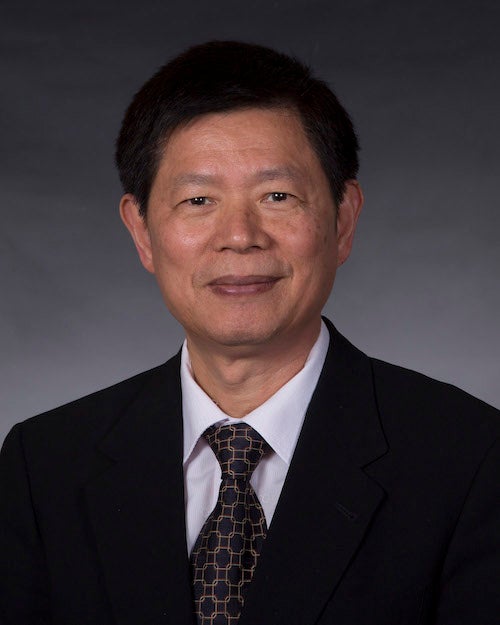Director of UCP to step down
Bill Kuo shaped UCP into a robust organization for the Earth system science community
Oct 14, 2024 - by David Hosansky
Oct 14, 2024 - by David Hosansky
Ying-Hwa "Bill" Kuo, who has directed the University Corporation for Atmospheric Research (UCAR) portfolio of community programs since 2015, has announced he will step down in March 2025. UCAR will conduct an international search for his replacement.
 UCAR Community Programs (UCP) provides the Earth system science community with various critical services and tools. These include real-time data delivery and software analysis tools, training for forecasters and emergency managers, support for a constellation of atmosphere-observing satellites, and more.
UCAR Community Programs (UCP) provides the Earth system science community with various critical services and tools. These include real-time data delivery and software analysis tools, training for forecasters and emergency managers, support for a constellation of atmosphere-observing satellites, and more.
“In the past decade, UCP has been transformed from a collection of loosely connected programs into a robust entity, with close collaborations that are improving operational efficiency while advancing important research and providing outstanding services for the entire Earth system science community,” Kuo said. “That is my pride.”
Kuo came to the National Science Foundation National Center for Atmospheric Research (NSF NCAR) in 1981 as a graduate student and then joined the staff after earning a Ph.D. in meteorology from Pennsylvania State University in 1983. He had been interested in meteorology since the age of 6, when a powerful typhoon that struck his native Taiwan impressed him with the impact that weather can have on society.
At NSF NCAR — managed by UCAR on behalf of the National Science Foundation — Kuo led the development of leading community mesoscale computer models, including the fourth and fifth generations of the Penn State/NCAR Mesoscale Model. MM4 and MM5 were widely used for weather forecasts, regional climate projections, and atmospheric research. Kuo subsequently played a key role in developing the NSF NCAR–based Weather Research and Forecasting model (WRF), a leading tool for both the research and forecasting communities.
Kuo then turned his meteorological expertise to satellite observations, serving as director of the UCAR COSMIC Program from 1997 to 2015. COSMIC (Constellation Observing System for Meteorology, Ionosphere, and Climate) was a U.S.-Taiwan collaborative mission that put the world’s first GPS radio occultation satellite constellation in orbit in 2006. In addition to working with Taiwan’s National Space Organization, Kuo developed partnerships with NSF, NASA, the U.S. Department of Defense, and NOAA. COSMIC and the subsequent COSMIC-2 satellite constellation have provided critical observations to support research and forecasting.
Kuo also directed the Developmental Testbed Center (DTC) from 2009 to 2018. A joint effort of NSF NCAR and several federal agencies, the DTC brings together practitioners in the weather modeling community to facilitate the transition of advances in weather prediction from research into operational forecasting.
As director of UCP, Kuo overhauled vital operational and administrative functions, creating a model known as Business Shared Services to improve the quality and cost-efficiency of business operations. He reorganized UCP into three centers — for education and training, Earth observation and data services, and partnership in science services — to create more cohesive interactions. Last year, Kuo oversaw the development of UCP’s first strategic plan, which involved 250 staff and external stakeholders and provided a unified strategic direction for the organization.
“We now have a solid foundation for UCP to achieve its next level of success,” Kuo said.
As Kuo moves into the next stage of his career, he will take on a half-time role in June next year as the senior advisor to the COSMIC director. In this position, he will provide guidance about the execution and development of the COSMIC program, mentor students and early career scientists, and conduct research on the data collected by COSMIC satellites. Kuo also plans to collaborate with scientists at the NSF NCAR Mesoscale and Microscale Meteorology Laboratory, where he built his scientific career.
Reflecting on his decades with UCAR and NSF NCAR, Kuo said, “I am most grateful for the opportunities to work with many great colleagues on exciting projects that significantly impact our community and society. It has been truly a privilege and honor to serve as the UCP Director for the past 10 years.”
“Bill is a consummate professional who has truly excelled in both research and leadership positions during his decades in the organization,” said UCAR President Antonio Busalacchi. “His many contributions have ranged from the improvement of weather forecasts that help safeguard society to the implementation of greater efficiencies in UCP. His leadership will be missed, but I am deeply grateful for all his work and very glad he will remain with us in a research and advisory role.”